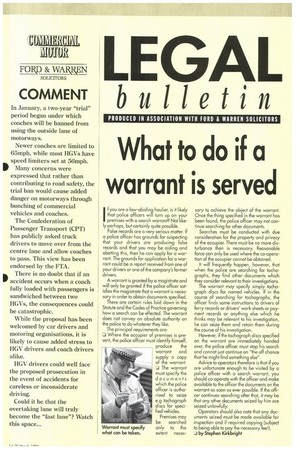GAL
Page 57

If you've noticed an error in this article please click here to report it so we can fix it.
lie tin
PRODUCED IN ASSOCIATION WITH FORD & WARREN SOLICITORS
What to do if a warrant is served
If you are a law-abiding haulier, is it likely that police officers will turn up on your premises with a search warrant? Not likely perhaps, but certainly quite possible.
False records are a very serious matter. If a police officer has grounds for suspecting that your drivers are producing false records and that you may be aiding and abetting this, then he can apply for a warrant. The grounds for application for a warrant could be a report received From one of your drivers or one of the company's former drivers.
A warrant is granted by a magistrate and will only be granted if the police officer satisfies the magistrate that a warrant is necessary in order to obtain documents specified. There are certain rules laid down in the Statute and the Codes of Practice governing how a search can be effected. The warrant does not convey an absolute authority on the police to do whatever they like. The principal requirements are:
ID Where the occupier of premises is present, the police officer must identify himself, produce the warrant and supply a copy of the warrant. C.1 The warrant must specify the documents which the police officer is authorised to seize e.g tachograph discs for specified vehicles.
Premises may be searched only to the extent neces
sary to achieve the object of the warrant. Once the thing specified in the warrant has been found, the police officer may not continue searching for other documents. Searches must be conducted with due consideration for the property and privacy of the occupier. There must be no more disturbance then is necessary. Reasonable force can only be used where the co-operation of the occupier cannot be obtained. It will frequently happen, however, that when the police are searching for tachographs, they find other documents which they consider relevant to their investigations.
The warrant may specify simply tachograph discs for named vehicles. If in the course of searching for tachographs, the officer finds some instructions to drivers of ferry records or drivers' work sheets or payment records or anything else which he thinks may be relevant to his investigation, he can seize them and retain them during the course of his investigation. However, if the tachograph discs specified on the warrant are immediately handed over, the police officer must stop his search and cannot just continue on "the off chance that he might find something else".
Advice to operators therefore is that if you are unfortunate enough to be visited by a police officer with a search warrant, you should co-operate with the officer and make available to the officer the documents on the warrant as soon as ever possible. If the officer continues searching after that, it may be that any other documents seized by him are seized unlawfully. Operators should also note that any documents seized must be made available for inspection and if required copying (subject to being able to pay the necessary feel). -I by Stephen Kirkbright
































































































































